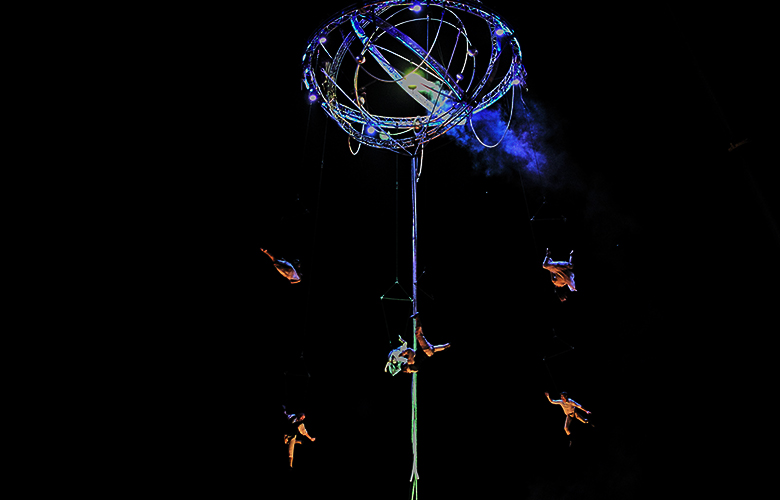
Choosing to be a circus artist means choosing a lifestyle, not a job. It ain’t all about business cards and bank accounts. Such a choice goes far beyond performing in front of an audience. Taking this path means taking charge of your schedule, body, training, and resting periods. Especially as a freelancer! Spending as much time looking for performance opportunities as you do performing onstage is an integral part of any performer’s life. In spite of the job hunt possibly leading to frustration and deceptions, this reality cannot be denied nor ignored.
There are long term contracts and shows that give their cast the luxury of knowing their weekly amount of shows as well as the exact sum they’ll make out of it. However, accepting and embracing a nomad life and not always knowing when the next show and paycheck will be, is most artists’ reality. Without being too specific and closed-minded, defining and deciding one’s living standards and main sources of happiness as early as possible will help them navigate confidently and properly on this journey.
Those who can’t commit to full-time circus life, who choose to give it fewer hours and less energy are just as talented as those who go on every night. Each individual should figure out how much circus and performances are necessary to feel satisfied on a daily basis. To feel good, NOT to look good. Creating acts feels more fulfilling than performing to some, and there are those for whom Christmas should only be spent with their parents, not with hundreds of strangers cheering them on. Both scenarios can significantly reduce one’s annual show total. Making that call on what comes first and the appropriate amount of performances remains an important and very personal step. One that must be taken by every artist without another’s or a producer’s approval.
Coaching, directing, casting, writing shows, or translating grant applications are some of many circus-related projects that can nourish one’s passion and keep them connected to the art form without taking a bow each night. Such activities can also fill the void in quieter times and relieve one from financial stress.
There also are ways to feel equally satisfied as an artist and a human being. The latter can have needs that aren’t compatible with an artist’s lifestyle. It is not always about balancing on one hand or on a high wire, but between personal and professional needs. Training and performing should bring joy to an artist, different types of it, but joy nevertheless. Feeling that doing so means missing out on other things is an indicator that the balance needs adjustments and that full-time might not be right. After all, some people are content with a single cookie while others need a full box!
Contracts and shows do not always come as much as one hopes for. Narrowing down which aspects of the performance provide most joy is key to off stage’s happiness. There are other ways to be active, to express creativity, to interact with others, and do all those other things that bring inspired individuals on stage. Finding alternate ways and places to meet those needs when meeting an audience is not possible means a happier life. One in which quieter times won’t feel so long. Maintaining those other sources of happiness can ultimately make stage time better as all of one’s joy does not solely rely on it.
Those who need it, who spend a lot, or determine someone’s success after their income should go on a different path. Despite the profession’s ups and downs, the “poor artist cliché” is one that does not apply to most, especially to those who know when and what to splurge on, who do not seek satisfaction through spending. In spite of not making a steady income, one can wind up earning as much, if not more than someone with a more conventional job at certain times. Some quick, short-term gigs can cover one’s monthly expenses in a single night, and, whilst more demanding time and energy-wise, a collection of regular little gigs, both on and off stage, can allow one to breathe steadily and calmly.
No circus school’s diploma or training has the appeal of an Ivy League school’s, but the knowledge gathered and experiences lived through time can make many very qualified for some positions, with the exception of a heart surgeon!
People, place, project, pay. The 4 Ps that are unlikely to come in one full package. A contract that offers two is worth looking into. The perfect show with the perfect cast in the perfect venue with the perfect salary does not exist. Being open to the unknown and accepting that things do not always go according to plan is crucial. One can be flexible without compromising themselves.
The nomad nature of the profession allows one to explore numerous cities and countries. Finding the right place, one that makes sense at a certain time is also key to staying balanced. Like shows that do not last forever, there is no need and no rush to commit to making such a place permanent. A house is a building, home is a feeling. As feelings and personalities change, so do one’s artistic needs and professional aspirations. Therefore, a place one immensely loved for years in their early performing days can feel foreign later in life as both the human and artist evolve.
As far as whether or not one has done enough, had a good career, succeeded or failed, there is only one judge, the same person able to call the final bow before moving away from the stage: Yourself. The artist with the mental foundation of knowing they’ve done everything they wanted and could.
When the Lights Go Off on Broadway
Ulrike Storch: Let Me Educate You


Impassioned by performing arts, Martin Frenette started intensive dance training at a very young age before trading pliés and barres for ropes and somersaults at Montreal's National Circus School. He has spent a decade in Europe, performing in various productions. Circus Monti, Chamäleon Theater, Wintergarten Varieté, Cirque Bouffon, GOP Show Concepts, and the Friedrichsbau Varieté have allowed him to grow artistically and humanly. Martin has also invested time working as an artistic consultant, director, and choreographer for both circus and dance projects. He enjoys splitting his time between Europe, Canada, and the US, working on stage and creating for others. Writing has always been a big passion of his and he's thrilled to share his views on shows, the stage, and what's going on behind the scenes with other performing arts enthusiasts!
Read Full Profile© 2021 TheatreArtLife. All rights reserved.

Thank you so much for reading, but you have now reached your free article limit for this month.
Our contributors are currently writing more articles for you to enjoy.
To keep reading, all you have to do is become a subscriber and then you can read unlimited articles anytime.
Your investment will help us continue to ignite connections across the globe in live entertainment and build this community for industry professionals.